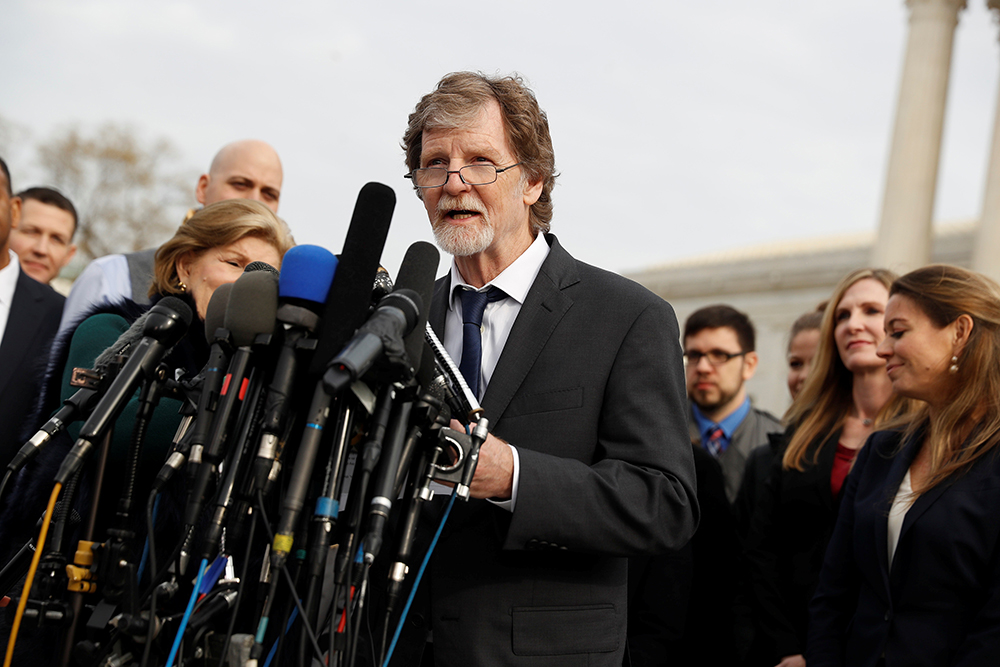
WASHINGTON — Colorado’s Supreme Court has agreed to hear the case of a Christian baker who refused to make a cake celebrating a gender transition.
The baker, Jack Phillips, owner of Masterpiece Cakeshop in Colorado, is no stranger to court battles over cakes. His 2012 refusal to make a wedding cake for a same-sex couple led to a U.S. Supreme Court case where the court ruled in 2018 that the state of Colorado had been hostile to Phillip’s religious beliefs and the government couldn’t force anyone to create works of art that communicate messages.
His victory in that case has been described as partial because the court did not specifically deal with First Amendment protections allowing businesses to refuse clients’ requests based on owners’ religious convictions.
In 2018, Phillips faced another lawsuit from a transgender woman, Autumn Scardina, who had requested a cake from Masterpiece Cakeshop celebrating a gender transition. Phillips refused to make the cake and was sued for discrimination.
When the case was argued at the trial court, Phillips said he didn’t believe someone could change genders, and he did not celebrate “somebody who thinks that they can.”
The trial judge’s ruling said Phillips violated Scardina’s rights by denying her service once he realized the cake was to celebrate her gender transition.
Earlier this year, he also lost this case before a state appeals court that ruled the cake was not a form of speech. It also said the state’s anti-discrimination law does not violate business owners’ right to practice or express their religion.
This case, which has now wound its way to the state’s Supreme Court, with no date yet given for arguments, once again involves the state’s anti-discrimination law and the court will consider if Phillips’ cakes are a form of speech.
It comes on the heels of another very similar case the U.S. Supreme Court ruled on this summer in favor of a web designer, Lorie Smith, also from Colorado, who didn’t want to design wedding websites for same-sex couples, saying it went against her religious beliefs.
Both sides in the upcoming cake case say the court’s ruling in the graphic designer’s decision — 303 Creative v. Elenis — could impact the state’s ruling.
“We are grateful that the Colorado Supreme Court will hear Jack Phillips’ case to hopefully uphold every Coloradan’s freedom to express what they believe,” said Jake Warner, the attorney from Alliance Defending Freedom, representing Phillips.
In a statement, he said: “Jack has been targeted for years by opponents of free speech, and as the U.S. Supreme Court recently held in 303 Creative v. Elenis, no one should be forced to express messages they disagree with.”
Scardina’s attorney, John McHugh, told The Associated Press that the Supreme Court’s ruling on the graphic artist’s case was narrow and applied only to businesses that are creating speech of their own — which the Colorado Court of Appeals had already ruled did not include Phillips’ company making the cake.
“It’s very important for businesses and the public in Colorado to understand that our anti-discrimination law still is in full force and there is no general right to discriminate against people in Colorado if you’re a business owner,” McHugh said.
In the designer’s case, the U.S. Conference of Catholic Bishops, joined by the Colorado Catholic Conference and other religious groups, sided with the designer as they had with the Colorado baker.
In their amicus brief, they said the web designer’s case gives the court the chance to clarify free speech issues that it fell short of doing in the case involving same-sex wedding cakes.
The USCCB’s brief said there was a “pressing need for the court to clarify how the compelled speech doctrine applies to wedding-vendor cases and other disputes.” It urged the justices to do what they have done in the past: “Apply the free speech clause to protect religious speech, thereby strengthening liberty not just for the religious but for all society.”

How many times must this man go to court already?